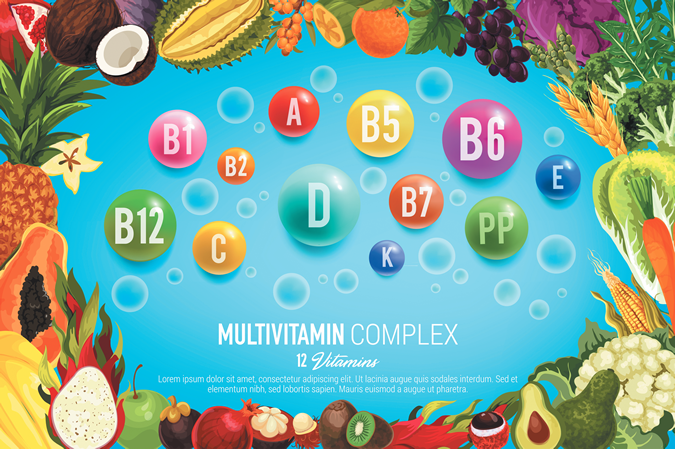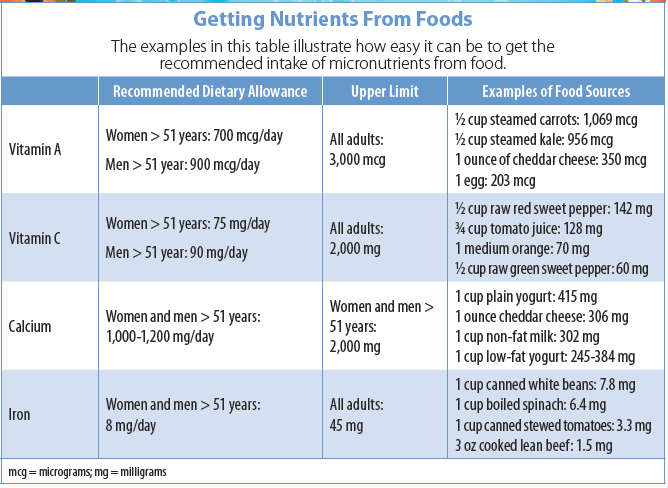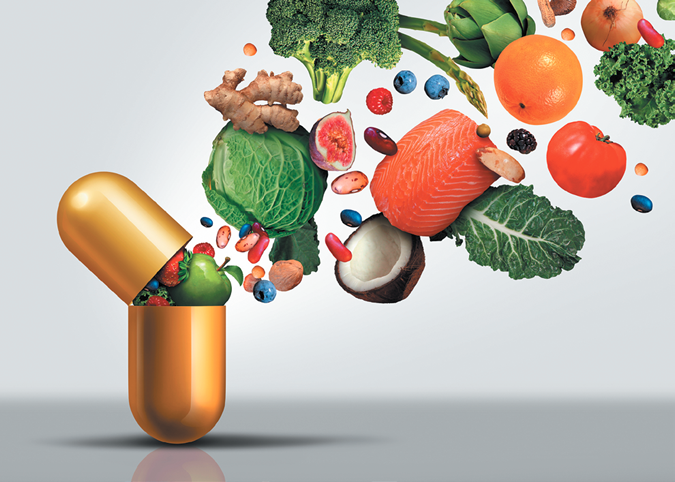A dietary pattern rich in foods such as fruits, vegetables, nuts, legumes, and whole grains is associated with better overall health and lower risk of death from all causes. Since the micronutrients in these foods are one of the reasons for their positive health effects, many Americans try to improve their odds for a long, healthy life by taking vitamin and mineral supplements. Unfortunately, data are increasingly showing that nutrient supplements do not have the same health effects as whole foods.
Not-So-Super Supplements: According to the latest analysis of national survey data, at least half of American adults take some kind of dietary supplement. (Dietary supplements include multivitamins/minerals, individual vitamins, minerals, and also non-vitamin, non-mineral supplements.) Nutrient supplements (vitamins and minerals) are touted as a way to help maintain health and are often seen as an insurance policy against dietary insufficiencies. Many of these supplements are falling short of their promise.

Numerous studies have failed to find associations between nutrient supplement use and health benefits. A 2018 systematic review and meta-analysis that pooled data on over two million participants concluded that multivitamin/mineral supplementation does not protect against cardiovascular disease. Supplementation with the antioxidant vitamin E, long touted as a way to prevent cancer, was found in a 2016 study published in the Journal of the American Medical Association (JAMA) to significantly increase the risk of prostate cancer among healthy men in doses as low as 400 International Units (IU) a day.
Source Matters: A new study led by Tufts researcher Fang Fang Zhang, MD, PhD, associate professor at Tufts’ Friedman School of Nutrition Science and Policy, looked for associations between intakes of 25 nutrients—from either foods or supplements—and death from any cause (all-cause mortality). The prospective cohort study, published in the April 2019 Annals of Internal Medicine, found that adequate intake of nutrients from foods was associated with a lower risk of all-cause mortality, whereas nutrients from supplements were not associated with mortality benefits and could even be associated with higher mortality risk when taken in excess. “The source of the nutrient—whether it is consumed from food or from supplement—is important in determining the benefits and risks of nutrient intake,” says Zhang. This may have to do with how (and how quickly) nutrients are absorbed by the body and how they circulate. The benefits of consuming nutrients in foods are also likely to reflect the complex interactions among the different components of a food: nutrients may act synergistically, rather than individually, to result in a specific health outcome, and there may be other bioactive compounds in food that are involved in beneficial effects.
Pregnant and lactating women, for whom higher intake of some nutrients like folate and iron is recommended, were excluded from this study. There are also certain groups who may need supplements to avoid shortfalls, like some older adults (whose ability to make stomach acid or absorb certain nutrients may be diminished) or vegans, who may need to make up for food restrictions. It is best to make these decisions with your healthcare provider.
“People take supplements to maintain general health, but that mindset needs to change,” says Zhang. Following a healthy dietary pattern, like a Mediterranean-style or DASH diet, is the best way to get the vitamins and minerals our bodies need.
Click image to enlarge

Research suggests that taking nutrient supplements in the absence of a specific nutrient deficiency does not improve health. Follow these tips for supplement use:
-Meet nutrient requirements by choosing foods that naturally have high concentrations of nutrients. Colorful vegetables, fruits, and nuts are all nutrient-rich.
-Vary preparation methods. Cooking makes certain nutrients, like vitamin A, more available, but destroys others, like vitamin C. Bell peppers, for example, contain both of these vitamins, so eat them cooked sometimes and raw other times.
-Talk to your healthcare provider before starting to take any nutrient supplements. Discuss any concerns you have about medical conditions and inform them if you have started or are considering starting a special diet that will change the type of foods you habitually consume. Examples include osteoporosis, long-term use of acid-suppressing medication or antibiotics, inflammatory bowel disease or other absorption disorders, and veganism.
-Keep in mind that, by law, refined grain products are enriched with thiamine, niacin, riboflavin and folate. Milk is enriched with vitamin D; and vitamin A is added to non-fat milk.






















Because supplements are not controlled by the FDA, they often have lessons more of the primarysupplement as well as have contaminants, some toxic. Other than as you outlined, supplements can be a waste of money.
Or, as someone once said, many supplements just turn into ‘expensive’ urine!
Or, as someone once said, many supplements just turn into ‘expensive’ urine!
It amazes me how many people who take supplements religiously, despite evidence to the contrary.
I agree, George. I have a friend who pays dearly for vitamins and supplements as she only buys “organic” ones that her chiropractor sells! She thinks that makes them better. What’s really amazing is she smokes and vapes! Talk about crazy logic!
I was disappointed that there were only dairy sources of calcium listed. While there is calcium in dairy, the cows get it from what they eat. People can also get calcium from plants just like dairy animals do. Broccoli, Brussels sprouts, and green leafy veggies like collards, kale, mustard greens, swiss chard and other leafy vegetables as well as legumes are loaded with highly absorbable calcium and other vital nutrients including fiber that is missing in dairy sources.